|
|
|
Sort Order |
|
|
|
Items / Page
|
|
|
|
|
|
|
| Srl | Item |
| 1 |
ID:
085986


|
|
|
|
|
| Publication |
2008.
|
| Summary/Abstract |
This article provides a study of the African National Congress (ANC) local organization at party branch level. It focuses on the branches' community activities, on their participation in party structures, and on the ANC political culture. It takes an organizational perspective on the study of political parties and refers to the mass party model. The ANC has a strong tradition of mass organization, and the ANC formal organization conforms to the mass party ideal-type: branches are meant to be active agents on the ground, while the party leadership is supposed to implement the membership's decisions. The ANC has developed a certain type of mass political culture, of popular politics. The article also shows how bottom-up decision-making processes concretely provide a certain level of influence to the members over the selection of leadership and the party's policies (even if through intermediary brokers). This article is a contribution to the renewed academic debates on African political parties and takes the stand that organizational and empirical approaches should be a priority.
|
|
|
|
|
|
|
|
|
|
|
|
|
|
|
|
| 2 |
ID:
113283
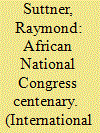

|
|
|
|
|
| Publication |
2012.
|
| Summary/Abstract |
The African National Congress (ANC) in South Africa was formed under difficult conditions, facing a Union government bent on extending racist laws and an unsympathetic British government to whom repeated petitions were addressed without success. By the 1930s petitioning had run its course and the organization collapsed. In the 1940s, however, structures were established which laid the basis for mass activities in the following decade. In the 1950s a range of campaigns of resistance gave rise to a large ANC constituency. It also elaborated an alternative democratic vision through adoption of the Freedom Charter in 1955, after a process of lengthy consultation. The document became a rallying point for a range of democratic organizations. After the Sharpeville massacre in 1960 the ANC was banned, but continued to operate illegally. It embarked on short-lived armed activities, leading to the arrest and exile of its leading figures. The years that followed saw further setbacks as the organization sought to establish itself outside, and in small underground units inside, the country. After the Soweto uprising of 1976, many young people joined the ANC's armed wing and carried out attacks on apartheid installations. Significantly, this period also saw the revival of mass public political activities on an unprecedented scale. A combination of internal and external pressures against apartheid paved the way for negotiations, resulting in democratic elections in 1994. The ANC now governs, having fundamentally, albeit unevenly, transformed the lives of many-but continued poverty, unemployment, extensive corruption and criminality risk leading to a deep systemic crisis affecting governance as a whole.
|
|
|
|
|
|
|
|
|
|
|
|
|
|
|
|
| 3 |
ID:
137570
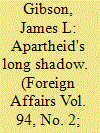

|
|
|
|
|
| Summary/Abstract |
Last April, South Africa celebrated the 20th anniversary of its first democratic elections, which brought to power the African National Congress (ANC) and its leader, Nelson Mandela, who had led the antiapartheid movement for decades. Many had long believed that civil war was the only way that the apartheid state would fall, and South Africa’s mostly peaceful transition from a racist authoritarian state to a multiracial democracy stands as one of the most surprising political developments of the twentieth century. The shift has not been without its problems, but few would contest South Africa’s credentials as a democracy—perhaps the most democratic state in Africa.
|
|
|
|
|
|
|
|
|
|
|
|
|
|
|
|
| 4 |
ID:
141071
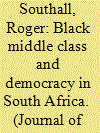

|
|
|
|
|
| Summary/Abstract |
Against the background of celebrations about the rise of a middle class in Africa and its widely posited role in promoting democracy, this paper explores the politics of the black middle class in South Africa. It does so by examining three propositions: first, that the black middle class was a positive force in the struggle for liberation and democracy; second, that post-1994 strategies of the African National Congress (ANC) government which have benefited it secure its political alignment with the ANC's ‘party-state’; and third, that its growth and increasing diversity will contribute to the consolidation of democracy. The conclusion drawn is that while the black middle class may indeed play an important role in furthering democracy, its political orientations and behaviour cannot be assumed to be inherently progressive.
|
|
|
|
|
|
|
|
|
|
|
|
|
|
|
|
| 5 |
ID:
114759
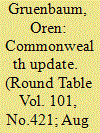

|
|
|
|
|
| Publication |
2012.
|
| Summary/Abstract |
The annual Failed States Index features several leading nations of the Commonwealth, including Nigeria, Uganda, Kenya and, of greatest concern, Pakistan. A death threat against a journalist by Sri Lanka's defence minister reveals that the government appears intent on cowing the press at home and ignoring criticism from abroad, with ominous implications for the country. An unseemly public row between members of Nelson Mandela's family has parallels with a power struggle within South Africa's ruling African National Congress.
|
|
|
|
|
|
|
|
|
|
|
|
|
|
|
|
| 6 |
ID:
085956
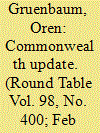

|
|
|
|
|
| Publication |
2009.
|
| Summary/Abstract |
The Awami League swept back to power in Bangladesh's first elections since a state of emergency was imposed in 2007. India accused Pakistan of aiding the Islamist terrorists who carried out the Mumbai attacks. South Africa's ruling African National Congress (ANC) split and corruption charges were revived against the ANC leader and putative next president, Jacob Zuma. Sri Lanka's army seized the Tamil Tigers' de facto capital and the country's leading journalist was assassinated. International euphoria over the election of Barack Obama as US president was tempered by the unfolding global recession; the US led the way, with 530,000 jobs lost in November.
|
|
|
|
|
|
|
|
|
|
|
|
|
|
|
|
| 7 |
ID:
117507
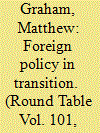

|
|
|
|
|
| Publication |
2012.
|
| Summary/Abstract |
At the beginning of the transition from apartheid to democracy, the African National Congress (ANC) was unprepared for foreign policy discussion, a lack of readiness magnified by the collapse of international Communism and the Cold War ideology. President De Klerk and the National Party controlled foreign policy in the early years of the transition and began the process of reintegration with the international community, The ANC initially struggled to adapt to the new international situation, whereas De Klerk was successful in wooing the international community. In the later stages of transition, the ANC developed a greater sense of direction and substance in foreign relations, although there were differences of opinion among and between the leadership and the rank and file. Already in 1994 there was evidence of tension between idealism and pragmatism. Post-apartheid foreign policy under Mandela was riddled with inconsistencies, which stemmed from the events of South Africa's transition
|
|
|
|
|
|
|
|
|
|
|
|
|
|
|
|
| 8 |
ID:
120985


|
|
|
|
|
| Publication |
2013.
|
| Summary/Abstract |
This article analyses the relationship between violence, the transition from apartheid, and contemporary state formation in South Africa. Through an ethnographic case study of the rural area of Umbumbulu outside Durban in KwaZulu-Natal, the article argues that prevailing interpretations of violence that focus on rivalry between political parties obscure the ways in which other factors - such as local power struggles among customary leaders and strongmen, state support for the rise of warlords, and the recruitment of young men through kinship and patronage networks - helped spread the violence. Local strongmen or warlords were motivated by the quest for power and economic success in their local communities as well as their beliefs in and strategic alliances with national-level political parties engaged in the struggle to end apartheid. In particular, the article focuses on a 'faction fight' in the mid-1980s and the subsequent violence that surrounded two warlords affiliated to the African National Congress in a region that was mostly dominated by Inkatha supporters. The alliances the ANC made with these warlords continued into the post-apartheid period and helped shape the ways in which power was exercised within the new political institutions of the democratic state.
|
|
|
|
|
|
|
|
|
|
|
|
|
|
|
|
| 9 |
ID:
147188
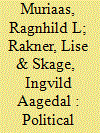

|
|
|
|
|
| Summary/Abstract |
The cases of the African National Congress (ANC) in South Africa and the Movement for Multiparty Democracy (MMD) in Zambia show major differences in the extent to which incoming ruling parties after a regime change build strong party systems. The ANC institutionalised a hegemonic party apparatus after coming to power, while the MMD did not. These differences, we contend, are related to the ANC’s history of a prolonged struggle that included violent conflict in contrast to the MMD’s peaceful pro-democracy campaign. Theorising this contrast provides a framework for investigating causes of different outcomes in party institutionalisation after regime change.
|
|
|
|
|
|
|
|
|
|
|
|
|
|
|
|
| 10 |
ID:
119121
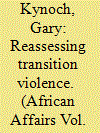

|
|
|
|
|
| Publication |
2013.
|
| Summary/Abstract |
Drawing on interviews with people involved in the communal violence that traumatized Thokoza and Katlehong townships in the early 1990s, this article challenges the received wisdom regarding transition violence in South Africa. Most significantly, it transcends the dominant narrative that African National Congress (ANC) supporters in the townships were under relentless attack by state security units known as the 'third force', along with the co-opted impis of the Inkatha Freedom Party (IFP). The evidence presented indicates that Inkatha was responsible for much of the violence, but that ANC-affiliated militants also conducted murderous campaigns. Some police commanders and their units initiated violence for political ends, but different police and military groups operated independently and lacked a uniform political orientation. Some favoured the IFP, some backed the ANC, while others were divided or indifferent. Thus, the narrative that casts the ANC as victims of a state-orchestrated onslaught versus the Inkatha sell-outs who opportunistically sided with the white government (and its security forces) does not accurately capture events on the ground in Thokoza and Katlehong, two of the townships most afflicted by transition violence. A more fractured, less partisan picture emerges from the voices of those who survived the township wars.
|
|
|
|
|
|
|
|
|
|
|
|
|
|
|
|
| 11 |
ID:
093949


|
|
|
|
|
| Publication |
2010.
|
| Summary/Abstract |
This article takes stock of the achievements and the shortcomings of post-apartheid South Africa, notably under the stewardship of Presidents Nelson Mandela and Thabo Mbeki. It analyses the implications of the General Elections held in April 2009 and offers some insights into the likely direction that a government headed by President Jacob Zuma will take over the coming months. The author argues, among other things, that the next five years will be crucial to the consolidation and promotion of constitutional democracy in South Africa, which in turn will determine the political future of the rest of sub-Saharan Africa.
|
|
|
|
|
|
|
|
|
|
|
|
|
|
|
|
| 12 |
ID:
153167
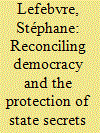

|
|
|
|
|
| Summary/Abstract |
South Africa has had a tortuous legal past. Its racial discrimination and segregation system, initiated by colonial rulers, became legal under of the National Party’s system of apartheid from 1948 to 1994. Under the appearance of the rule of law, non-whites were marginalized in all aspects of life, forcibly confined to geographic areas, and prevented from participating in decisions affecting their country’s destiny.
|
|
|
|
|
|
|
|
|
|
|
|
|
|
|
|
| 13 |
ID:
117900
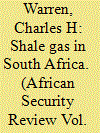

|
|
|
|
|
| Publication |
2013.
|
| Summary/Abstract |
The potentially large shale gas reserves in South Africa's Karoo region have provoked serious debate. Critics cite legitimate environmental concerns related to hydraulic fracturing, the controversial gas extraction technique also known as 'fracking'. Members of industry and others promote the potentially transformational impact on South Africa's post-apartheid economy. Yet scholars and analysts have thus far focused on immediate concerns and relatively short-term goals. To address the broader security implications related to South Africa's potential commercial shale gas reserves, this article takes a new approach and establishes important areas of further study.
|
|
|
|
|
|
|
|
|
|
|
|
|
|
|
|
| 14 |
ID:
108701
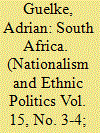

|
|
|
|
|
| Publication |
2009.
|
| Summary/Abstract |
The article revisits South Africa's unexpected transition to majority rule during the early 1990s. It underscores how surprising this development was by recalling the range of possibilities that appeared to exist at the time of apartheid's demise. The course of events that led to the African National Congress's achieving its objective of one person one vote in an undivided country is briefly explained, while the longer term trends that helped to make such an outcome possible are also identified. The manner in which the country has managed without the political devices commonly associated with the governance of deeply divided societies is analyzed.
|
|
|
|
|
|
|
|
|
|
|
|
|
|
|
|
| 15 |
ID:
125280
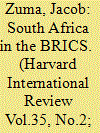

|
|
|
|
|
| Publication |
2013.
|
| Summary/Abstract |
South Africa will celebrate its 20 years of democratic rule next year, following the demise of apartheid in 1994. The ruling African National Congress (ANC), which is also the oldest liberation movement on the continent, celebrated its 100th anniversary last year. As its core statement of principles, the "Freedom Charter" was adopted in Kliptown on June 26, 1955. It declared that "There shall be Peace and Friendship" and projected that South Africa shall be a fully independent state that respects the rights and sovereignty of all nations, strives to maintain world peace and the settlement of all international disputes by negotiation - not war, and calls for peace and friendship amongst all our people secured by upholding the equal rights, opportunities and status of all.
|
|
|
|
|
|
|
|
|
|
|
|
|
|
|
|
| 16 |
ID:
044701
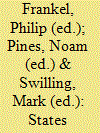

|
|
|
|
|
| Publication |
London, Croom Helm Ltd., 1988.
|
| Description |
325p.hbk
|
| Standard Number |
0709949006
|
|
|
|
|
|
|
|
|
|
|
|
Copies: C:1/I:0,R:0,Q:0
Circulation
| Accession# | Call# | Current Location | Status | Policy | Location |
| 029431 | 968.063/FRA 029431 | Main | On Shelf | General | |
|
|
|
|
| 17 |
ID:
099367
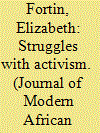

|
|
|
|
|
| Publication |
2010.
|
| Summary/Abstract |
In 2004, a long-awaited piece of post-apartheid legislation, the Communal Land Rights Act - to reform the land tenure of those living in the former 'homelands' of South Africa - was passed into law unanimously by parliament. This unanimity, however, conceals the extent to which the process towards this moment was deeply contested. Exploring the efforts by land sector NGOs to secure legitimacy in their engagements with this process reveals the extent to which wider power relations and contestations have determined their positioning. Those within the non-governmental land sector who opposed the legislation pitted themselves against African National Congress politicians and high-profile traditional leaders. However, the adoption of a Mamdani-inspired discourse to contest such politics and oppose the proposed legislation contributed to reinscribing narrow readings of knowledge considered to be legitimate. Their engagements were also shaped by changes in the NGO sector. Reduced funding for land sector NGOs and an increasingly ambivalent relationship between them and government contributed to contestations between NGOs and among people working within them. Their strategic engagements in such wider and internal politics influenced both the frames within which such policy change could be debated and the ways in which individuals working for NGOs consequently positioned themselves in relation to their constituents.
|
|
|
|
|
|
|
|
|
|
|
|
|
|
|
|
| 18 |
ID:
129097
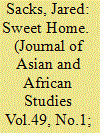

|
|
|
|
|
| Publication |
2014.
|
| Summary/Abstract |
For much of the winter of 2012, communities in shack settlements across Cape Town took to the streets in some of the most active civil disobedience protests since 1994. Knowing that the mainstream political terrain often seeks to obfuscate and mislead the public about the true nature of these protests, this paper investigates claims by politicians from the Democratic Alliance (DA) that these protests were being coordinated by the Youth League of the African National Congress (ANCYL). These big political players moralize the debate, shifting the focus from the perfectly legitimate issues of service delivery and demands for meaningful engagement. Speaking directly to community members of Sweet Home Farm, an informal settlement of 15,000 people in the Philippi area, revealed a yawning chasm between what official players are saying about Sweet Home and the actual realities on the ground.
|
|
|
|
|
|
|
|
|
|
|
|
|
|
|
|
| 19 |
ID:
104251
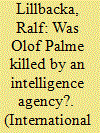

|
|
|
| 20 |
ID:
119402
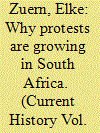

|
|
|
|
|
| Publication |
2013.
|
| Summary/Abstract |
While the ANC retains a firm grip on power, factionalism within the party, corruption, and an increasing distance from ordinary people undermine its ability to deliver on its promises.
|
|
|
|
|
|
|
|
|
|
|
|
|
|
|
|
|
|
|
|
|